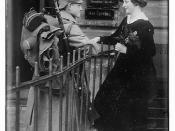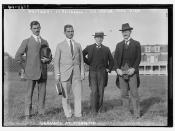(note: this was originally an oral presentation, and can be easily converted to essay form)
Until 1914, all previous wars had been confined to small areas involving relatively small armies. World War I was the first ever 'total war' - where all aspects of a country's economic, social and political systems became devoted to the waging of the war effort.
In July of 1914, Europe was at war.
For the soldiers, the lack of education of the war's possibilities played a huge role in their changing attitude towards the war.
Source. A shows a large group of German enthusiasts marching off to join up for the war. Their courageous smiles and celebration shows their obvious lack of knowledge of the gruesome and tragic war that lay before them. This was a common scene in Paris, London, Vienna and Prague, as the source states, and shows the positive attitude of fighting prior the war.
Both sides were thrown into a whole new style of warfare never before seen. Technological advances ensured that the Great War would be different to any other before it. The common belief amongst soldiers, and those who stayed home for that matter, was that the war would be over by Christmas 1914. When Christmas came along, many of the British and German soldiers on the Front line arranged a truce between themselves and socialised as friends. This truce displayed the common attitude of soldiers at the time, who saw themselves as pawns dying for unnecessary political feuds.
A common enlistment tactic was the idea of joining with a mate. Many of these groups of healthy young men (often students, as Source. A shows) were split apart in wasted attacks with questionable tactics for little to no gain. Eventually, the loss of enlisted friends and family members led...


![[German vehicle tax registration issued to George Grantham Bain] (LOC)](https://s.writework.com/uploads/6/60390/german-vehicle-tax-registration-issued-george-grantham-bain-thumb.jpg)
This is great
this essay/speech was extremely informative and is really helping me in my study of 'World War One and Its Aftermath'
I love your use of sources.
1 out of 1 people found this comment useful.